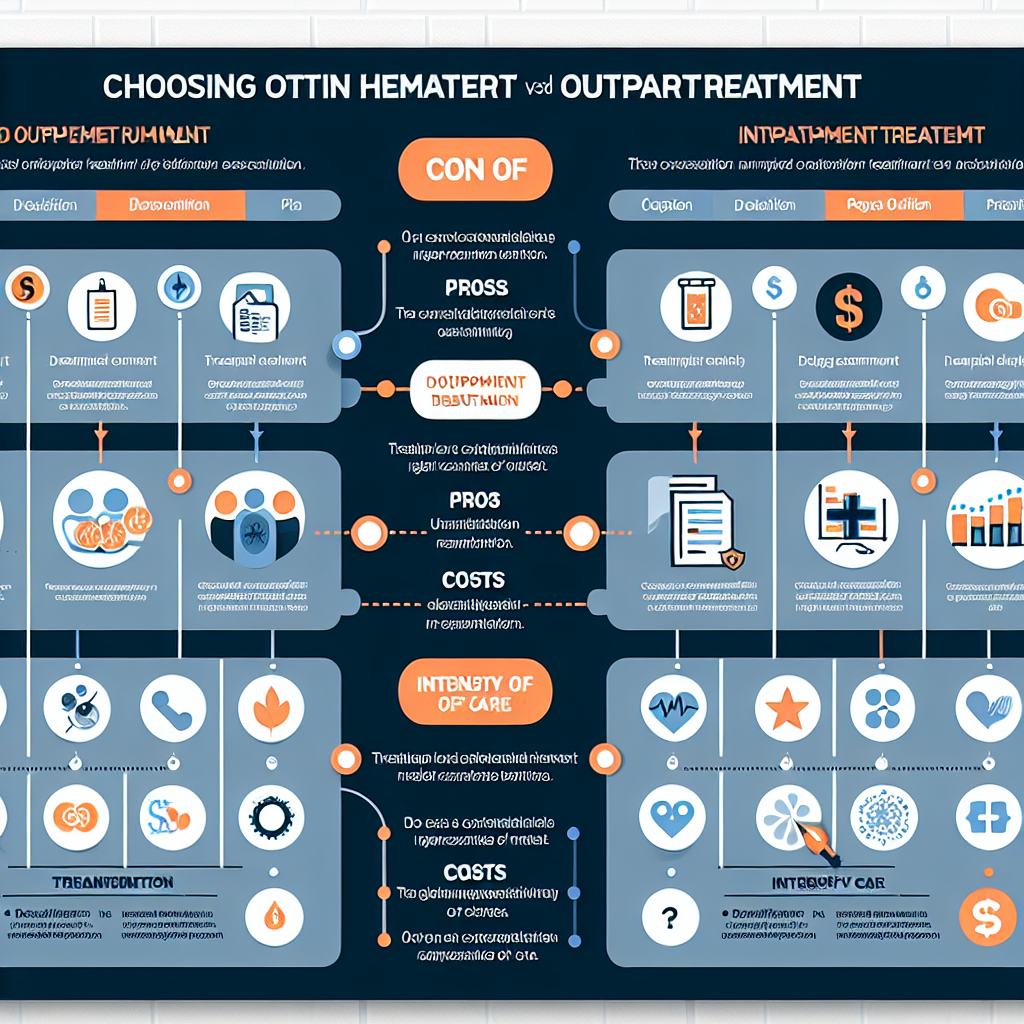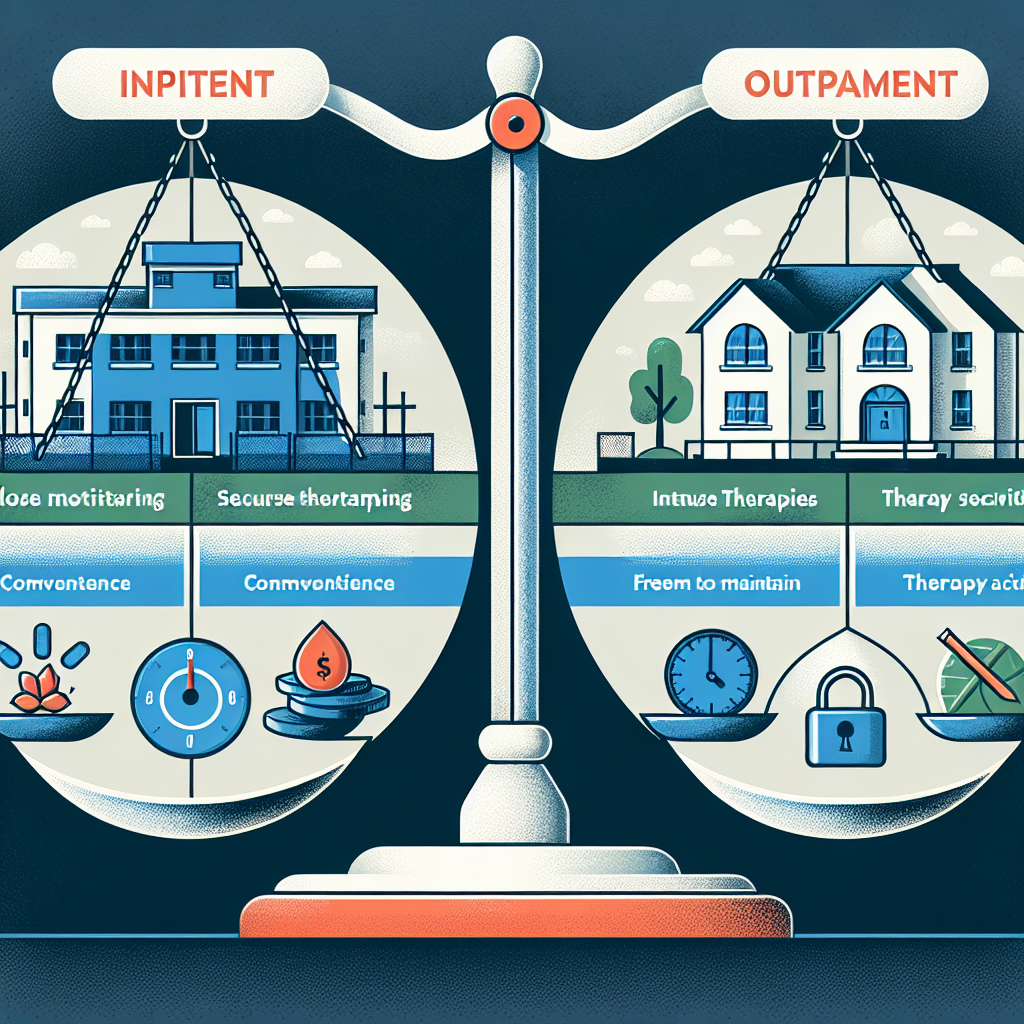-
Table of Contents

“Choose the path to recovery: Inpatient for intensive support, outpatient for flexible healing.”
Introduction
When choosing between inpatient and outpatient treatment for drug addiction, several critical factors must be considered to ensure the most effective and appropriate care. These include the severity of the addiction, the presence of co-occurring mental health disorders, the individual’s home environment, the level of support available from family and friends, and the specific needs and preferences of the person seeking treatment. Inpatient treatment offers a structured, immersive environment with 24/7 medical and therapeutic support, which can be crucial for those with severe addictions or unstable living situations. Outpatient treatment, on the other hand, provides more flexibility, allowing individuals to maintain their daily responsibilities while receiving care, making it suitable for those with milder addictions or strong external support systems. Evaluating these factors carefully can help determine the most suitable treatment approach for achieving long-term recovery.
Factors To Evaluate When Deciding Between Inpatient And Outpatient Drug Addiction Treatment
When faced with the daunting decision of choosing between inpatient and outpatient treatment for drug addiction, it is crucial to consider several factors that can significantly impact the recovery journey. Understanding these factors can help you or your loved one make an informed choice that aligns with personal needs and circumstances, ultimately fostering a successful path to sobriety.
First and foremost, the severity of the addiction plays a pivotal role in determining the appropriate level of care. Inpatient treatment, also known as residential treatment, is often recommended for individuals with severe addiction issues. This type of treatment provides a structured environment where patients can focus entirely on their recovery without the distractions and temptations of everyday life. On the other hand, outpatient treatment may be more suitable for those with milder addiction or those who have already completed an inpatient program and are looking for continued support.
Another critical factor to consider is the presence of co-occurring mental health disorders. Many individuals struggling with addiction also face mental health challenges such as depression, anxiety, or PTSD. Inpatient treatment facilities are typically better equipped to address these dual diagnoses, offering integrated care that includes both addiction treatment and mental health services. This comprehensive approach can be essential for achieving long-term recovery. Conversely, outpatient programs may not provide the same level of mental health support, which could be a limiting factor for some individuals.
The support system available to the individual is another important consideration. Inpatient treatment offers a community of peers and professionals who understand the struggles of addiction, providing a built-in support network. This can be incredibly beneficial for those who lack a strong support system at home. However, if an individual has a robust network of family and friends who are committed to their recovery, outpatient treatment can allow them to maintain these vital connections while receiving the care they need.
Financial considerations also play a significant role in the decision-making process. Inpatient treatment programs tend to be more expensive due to the comprehensive care and accommodations provided. Insurance coverage can vary widely, so it is essential to understand what your policy covers and what out-of-pocket expenses you may incur. Outpatient treatment is generally more affordable and may be a more viable option for those with limited financial resources. However, it is important to weigh the cost against the potential benefits of each type of treatment.
The individual’s daily responsibilities and commitments must also be taken into account. Inpatient treatment requires a significant time commitment, often lasting 30, 60, or 90 days, during which the individual will reside at the treatment facility. This can be challenging for those with work, school, or family obligations. Outpatient treatment offers greater flexibility, allowing individuals to attend therapy sessions and support groups while continuing to meet their daily responsibilities. This flexibility can make outpatient treatment a more practical option for many people.
Ultimately, the decision between inpatient and outpatient treatment should be guided by a thorough assessment of the individual’s unique needs and circumstances. Consulting with healthcare professionals, addiction specialists, and loved ones can provide valuable insights and support during this critical decision-making process. Remember, the goal is to choose a treatment plan that offers the best chance for lasting recovery and a healthier, more fulfilling life. By carefully considering these factors, you can make an informed choice that sets the stage for a successful journey to sobriety.
Key Considerations For Choosing The Right Drug Addiction Treatment: Inpatient Vs. Outpatient
When faced with the daunting task of choosing the right treatment for drug addiction, understanding the key differences between inpatient and outpatient programs is crucial. Both options offer unique benefits and challenges, and the decision ultimately depends on individual needs, circumstances, and goals. By carefully considering various factors, you can make an informed choice that sets the foundation for a successful recovery journey.
First and foremost, the severity of the addiction plays a significant role in determining the appropriate treatment setting. Inpatient treatment, also known as residential treatment, is often recommended for individuals with severe addictions or those who have struggled with relapse. This type of program provides a structured environment where patients live at the facility for a specified period, typically ranging from 28 days to several months. The immersive nature of inpatient treatment allows for intensive therapy, medical supervision, and a break from the triggers and stressors of daily life. On the other hand, outpatient treatment is more suitable for those with milder addictions or strong support systems at home. This option allows patients to continue their daily routines while attending therapy sessions and support groups on a part-time basis.
Another critical consideration is the level of support and supervision required. Inpatient programs offer 24/7 medical and emotional support, which can be invaluable for individuals with co-occurring mental health disorders or those at risk of severe withdrawal symptoms. The constant supervision ensures that any medical emergencies or psychological crises are promptly addressed. Conversely, outpatient treatment provides more flexibility and autonomy, which can be beneficial for individuals who have work, school, or family commitments. However, this also means that patients must have a high level of self-discipline and motivation to stay on track with their recovery.
The cost of treatment is another factor that cannot be overlooked. Inpatient programs tend to be more expensive due to the comprehensive care and accommodations provided. Many insurance plans cover a portion of the costs, but out-of-pocket expenses can still be significant. Outpatient treatment is generally more affordable, making it a viable option for those with financial constraints. It is essential to explore all available resources, including insurance coverage, sliding scale fees, and financial assistance programs, to ensure that cost does not become a barrier to receiving the necessary care.
Family involvement and support are also crucial elements to consider. Inpatient treatment often limits family interactions to scheduled visits and therapy sessions, which can be beneficial for individuals who need to distance themselves from toxic relationships or environments. However, for those with supportive families, outpatient treatment allows for greater involvement in the recovery process. Family therapy sessions and support groups can help rebuild trust, improve communication, and create a strong support network that extends beyond the treatment period.
Lastly, personal preferences and lifestyle factors should not be underestimated. Some individuals thrive in the highly structured environment of inpatient treatment, while others may feel confined and prefer the freedom and flexibility of outpatient care. It is essential to reflect on your own needs, preferences, and recovery goals when making this decision.
In conclusion, choosing between inpatient and outpatient treatment for drug addiction requires careful consideration of various factors, including the severity of the addiction, level of support needed, cost, family involvement, and personal preferences. By weighing these key considerations, you can make an informed decision that aligns with your unique circumstances and sets you on the path to a successful and lasting recovery. Remember, the journey to sobriety is deeply personal, and the right treatment choice is one that best supports your individual needs and aspirations.
Q&A
1. **Severity of Addiction**: Inpatient treatment is often recommended for severe addictions, as it provides a structured environment with 24/7 medical and emotional support. Outpatient treatment may be suitable for those with milder addictions who have a strong support system at home.
2. **Personal and Professional Obligations**: Inpatient treatment requires a significant time commitment, often 30 days or more, which may not be feasible for individuals with work, school, or family responsibilities. Outpatient treatment offers more flexibility, allowing individuals to attend therapy sessions while maintaining their daily routines.
Conclusion
When choosing between inpatient and outpatient treatment for drug addiction, consider the severity of the addiction, the need for medical supervision, the presence of co-occurring mental health disorders, the level of support in your home environment, your ability to commit time to treatment, and financial considerations. Inpatient treatment offers intensive, round-the-clock care and a structured environment, which is beneficial for severe addictions and those with unstable home environments. Outpatient treatment provides more flexibility and allows individuals to maintain daily responsibilities, making it suitable for those with milder addictions and strong support systems. Ultimately, the decision should be based on a comprehensive assessment of your specific needs and circumstances.



